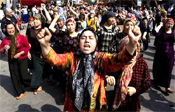 |
| A group of Uighurs protest in front of journalists visiting the area in Urumqi, China, Tuesday, July 7, 2009. The city, where rioting and ethnic clashes killed over one hundred people two days ago, remained extremely tense Tuesday, as security officials and police continued to work to restore order. (AP Photo/Ng Han Guan) |
China has long been seen as a friend by Arabs and Muslims. In part that is because of its staunch support for the Palestinians although there is much more to it than that. There has been a rich history of Chinese-Arab and Chinese-Muslim interaction for over 1,400 years. As early as 651 AD, Caliph Uthman sent an ambassador, a companion and cousin of Prophet Muhammad (peace be upon him), Saad ibn Abi Waqqas, to the Chinese Emperor Gao-Zhong. He responded by giving Muslims the right to build a mosque in the port of Chang'an, halfway between Guangzhou (Canton) and modern Hong Kong; it still exists. Thereafter, for over a thousand years, Muslims played an influential role in the history of China, as leading merchants, army officers and government officials. That remarkable history counts for a great deal in Muslim minds.
However, matters could change. The violence meted out to Uighur protesters in Urumchi, capital of Xinjiang, comes as a shock. It is unclear how many of them have died but there are reports of at least 140, with more than 800 injured. Hundreds more have been arrested. It is the most brutal act of violence against protesters since Tiananmen Square 20 years ago. It is bound to influence the way Muslims perceive China.
The Turkic Muslim Uighurs are the indigenous inhabitants of Xinjiang. Twice in the last century, they enjoyed brief periods of independence but in the past 20 years or so there has been growing resentment at Beijing's policies, in particular, its resettlement of millions of Han Chinese there. The Uighurs have seen their homes demolished to make way for the Han immigrants; their culture has been swamped and they themselves reduced to a minority in their own homeland.
Meanwhile, the jobs have gone to the immigrants. It is a cocktail for bitterness and occasionally terrorism, as individuals seek to draw international attention to their plight. Just before last year's Beijing Olympic Games, two Uighurs attacked and killed 17 policemen in the historic city of Kashgar near the border with Kyrgyzstan. Till now, however, the rest of the world, including the rest of the Muslim world, has largely ignored their plight - in no small part, it has to be admitted, because of political considerations. Turning a blind eye is not going to be an option after this incident. Views on China's attitude toward its Muslim population will harden. Muslims (and others) are bound to question whether there is any difference between Israel trying to crush a people and create facts on the ground by building settlements and China doing the same with its policy of Han migration.
China takes the view that its internal affairs are its private concern and that no one else has the right to express any views whatsoever - praise excepted - about what happens within its borders.
The world is not like that any more, and China has to realize that persecution of its Muslims will not go unnoticed or uncommented upon. That does not mean that relations between China and the Muslim world are going to move into a freeze. They will remain as vital as those with Western countries accused of anti-Muslim policies. But the persecution could put a strain on Chinese-Muslim relations.
Source: Arab News